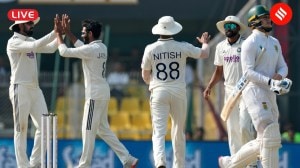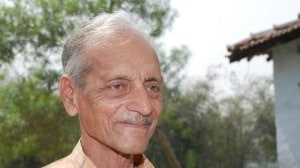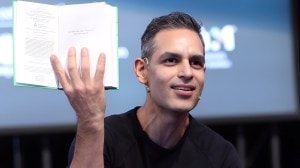Q marks dent the halo around a ‘renunciant’
Every saint has a past and every sinner a future. The saying yields two thoughts. One is about the redemptive power of time, which can help ...

Every saint has a past and every sinner a future. The saying yields two thoughts. One is about the redemptive power of time, which can help any person achieve self-transformation if they make conscious and sustained efforts. Secondly, saints, to be called saints, have to be truthful about their past. True saints never try to hide it, much less use questionable means to suppress it. They take responsibility for all their actions and utterances. And if something is falsely alleged against them, they allow, with supreme equanimity, the society to scrutinise their lives and come to its own conclusions. We know, for example, how transparent Mahatma Gandhi’s life was. So much so, that when he said ‘‘My life is my message’’, people believed him.
Come now to the other Gandhi who was conferred sainthood by her party when she ‘‘renounced’’ India’s premiership in May 2004. Since truthfulness and accountability are two qualities that are expected not only in a saint but also in any politician who wields supreme power in a democracy, how does Sonia Gandhi measure up to this requirement?
The nation would have been content to apply lower standards to measure her, standards that are used to judge ordinary politicos. But it cannot do so here for three reasons. Firstly, renunciants must submit the halo around them to a closer scrutiny. Secondly, Sonia Gandhi is no ordinary politician; her authority surpasses that of the PM. The third reason is the most important. All justice-loving Indians nurse a guilty conscience; they want to know if her late husband was unfairly penalised in the 1989 elections when he was unseated from power over the Bofors issue. They do know that the Delhi High Court absolved him in February 2004. But they would have a surer reason to own up the mistake if the names of Rajiv and Sonia are also cleared in that troublesome remnant of the Bofors case which involves Ottavio Quattrocchi, who wielded enormous clout in Rajiv’s government thanks solely to his Italian connection.
Investigation has conclusively shown that Q was the real sutradhar of the Bofors drama. So far Sonia Gandhi has failed to erase troubling question marks about her links with Q. The suspicion that she helped him flee the country in 1993 is reinforced by her subsequent defence of the fugitive, one who had the cheek to say he was not coming to India to face trial because ‘‘I have no faith in India’s justice system’’. In her only public pronouncement on Q so far (at a press conference on August 13, 1999), she said: ‘‘The CBI has said he is a suspect. But we have never seen the papers naming him in the deal. They should show the papers establishing that he is guilty.’’
This, after four courts (three in India and one in Switzerland) had already established Q’s guilt. This, after the man had cheated India’s highest court just to escape imminent arrest. This, after the CBI had already secured copious documentary evidence (including photographs, telephone records and diary entries showing his close ties to Sonia and Rajiv Gandhi) that nailed both his crime and his patrons. If you have difficulty going through the forest of media reports on the matter, just read two on the internet—N Ram’s illuminating cover story ‘Know Your Bofors’ in Frontline of November 13, 1999, and A G Noorani’s ‘Rajiv & Bofors’ in The Statesman of December 16-17, 1999. (Neither Ram nor Noorani is a friend of Sonia’s political opponents. Indeed, they are fierce critics of the BJP.)
And then ask yourself the basic question: Why did Sonia Gandhi decline to become the PM in May 2004? Might it be because she would have to answer some highly inconvenient questions if Q were ever brought to trial? Could the UPA Government have defreezed Q’s London accounts, and could he have walked away with Rs 21 crore from those accounts on the very day that the Supreme Court had asked the CBI to maintain the status-quo, had she been the PM? Did she ‘‘renounce’’ premiership because she wanted Q’s ‘‘acquittal without trial’’ effected by someone else?
Saints don’t do tyag (renunciation) for reasons of realpolitik, to save their own skin for their problematic actions in the past or as an investment to reap dividends in the future. The fakery will no doubt be exposed some day. But right now, it’s instructive to see how the UPA Government is moving systematically to close the Bofors case altogether. Recall the government lawyer’s statement, before the Supreme Court on January 24, about the ‘‘imminent unlikelihood of securing the presence of Quattrocchi for completing the trial’’. Replace the word ‘‘imminent’’ with ‘‘permanent’’, and you’ll know the fraud being perpetrated on the nation. The apex court is our only hope now if the motto of our Republic—Satyameva Jayate—is not to taste despairing defeat in the Bofors case.
As I said in my last column, the Bofors scam is not an ordinary case of corruption but an example of gigantic official cover-up, sabotage and political immorality. One that has put a huge question mark over the efficacy and integrity of India’s criminal justice system—indeed, over India’s democracy itself. Soniaji, come clean on your links with Q even at this late stage. Else, history will not absolve you.
And here is a poser to Rahul Gandhi: ‘‘I liked your speech in Hyderabad. I liked your humility. I liked especially your attempt to make our youth feel hopeful about India’s future. But ask yourself honestly—Is the odious example your family has set in the Bofors case going to strengthen, or weaken, young Indians’ faith in our democratic institutions?’’
write to sudheenkulkarniexpressindia.com




- 01
- 02
- 03
- 04
- 05



























